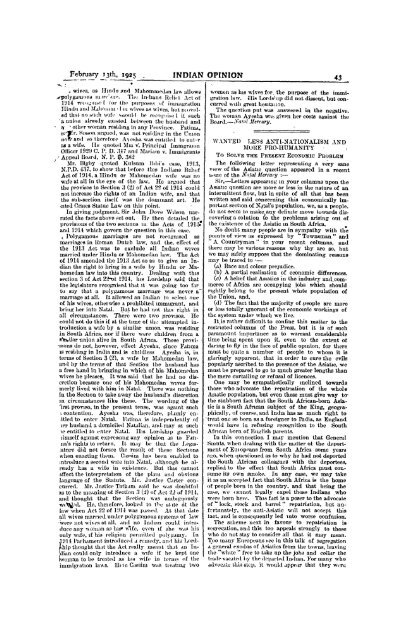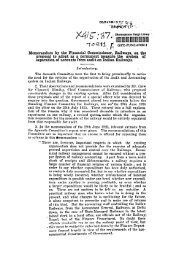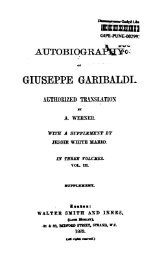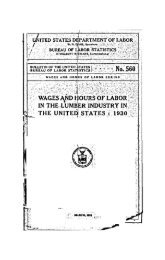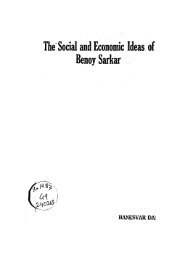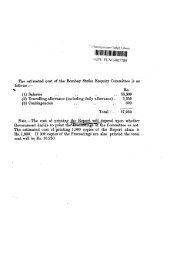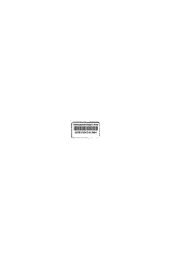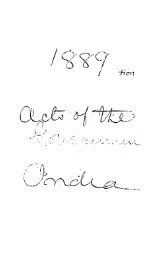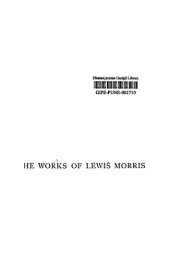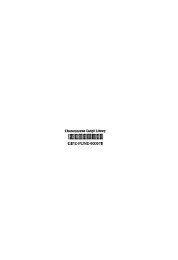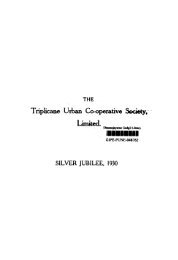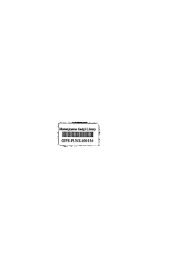You also want an ePaper? Increase the reach of your titles
YUMPU automatically turns print PDFs into web optimized ePapers that Google loves.
I<br />
February J 3th, 1925 INDIAN OPINION 409<br />
~<br />
-------<br />
~<br />
-------.<br />
-------------.-------------------------~~~<br />
'. wiv('s, as HlOnn ~nli MahommetlAn 1.1\\ allows<br />
"'l'olygalllou.; ll11rl··.t~I'. TllIJ In' hans Helif l Act of<br />
1~14 l"P(IJ~II1"(- t i 01' t/lP pllrpose:'! 1)( irnnll~r'LtiO!l<br />
HindI! all11 ~Llh()1J1I1l ,1111 wiveH WI wive!!, but (JlllvlIled<br />
thltt no :-.lleh Wlft' "'lonid bE' I'ec()~nh,~ 1 it fluch<br />
'a union already eXlsteci between the husband and<br />
~ 'othpr woman residing in any Province, Fatilllil.<br />
s('~rr. Hlssnn argued, WdS not re8idin~ in the Gillon<br />
llo\r and HO thE'refnl'p A ~ e"ha WdS entltle,l to eut""<br />
as a wife. JIe quotell :\lm v .. Principal ImmgralOn<br />
Officer 1921J C. P. D. :a7 and Marialll v. Immil-!rank:<br />
! Appeal Ho,mI, N. 1'. JP. :~>\2<br />
Mr. Bigby quoted Kulsum Blbi'!l case, 191:l,<br />
N.P.D. 4:37, to show that beforo thIS Inlli,lJls Rehef<br />
Act of 1914, a Hindu or Mahomed,m WIfe was no<br />
WIfe at all in the eye of the law. He argned that<br />
the provisos to Section a (2) of Act 22 of 1914 could -<br />
not increase the rights of an Indian wife, anu that<br />
the sub-section itself WaR the dommant art. He<br />
Clte!l Cr,nes 8tatue Law on this point.<br />
In giving Judgment. Sir John Dove WJlson narrated<br />
the f:JCt;l above !let out. Ill' then detailed the<br />
provhnons of the two sectIOns 111 the Acts of 191;):<br />
and 1\)14 which govern the question in this case.<br />
I l'olygamouH marriages are not re('ogmsed as<br />
marriages in Homan Dutch IJ.w, and the, effect of<br />
the 1!Jl:J Act was to exclude all IndIan WIves<br />
married under Hindu or Mahomedan law. The Act<br />
of H114 amended the 191:f Act flO afl to give an In.<br />
dian the right to bring in a Wife by Hmdu or Mahomedan<br />
law into this country. Dealing With thIS<br />
section :l of Act 2~t 19H. IllS Lordship fJc\id that<br />
the legislature I'ecognitled tlldt It was going too br<br />
to say that a pulygamous marrIage was never a<br />
marriage at all. It allowed an Indian to solect. one<br />
of his wives, otherwise :\ prohibited Immigrant, and<br />
bl'ing her into NatJ.l. ~u~ he had not thiS right in<br />
all circLUnstancel!. There were two provIsos. He<br />
could not du this if at the bme of the attempted int,'olIuction<br />
a Wife by a similar umon was residing<br />
hl South Africa. nor if there wel'e children from a<br />
IIbUar union alive in South Afr1ca. These provi-<br />
'!llons do not, however, effect Ayesha, since Fatlma<br />
IS resilhng in India and is childless Ayesna is, in<br />
torms of Section 3 (2), a WIfe by Mahomedan law,<br />
anll by the terms of that Section the husband has<br />
a free hJ.nu in bringing in which of his.. Mahomedan<br />
wi ves he pleases. It was said that he had no lliscretioll<br />
because -"one of his Mahomedan wIves formerly<br />
lived with him in Natal. There was nothing<br />
in the SectIOn to take away the husband's discretion<br />
III circumstances like thes£'. The wordmg of the<br />
'irst prOVISO, in thE:' present tenst!, was ngamt snch<br />
~ contention. AyeshJ. was, then-fon-, pl.unly eD<br />
,Hled to enter Natal. }'atim,\ is indepen.lently of<br />
IeI' huslJUnu a domiciled Nat.1Iia.n. ,lnlL mav as sl1ch<br />
)e entitled to t-nter Nat.tl. IllS LorJ5hll; gn,mled<br />
limself agmnst expresslIlg iilny opinion as to Fahnn's<br />
rights to return. It m,l)' 1)l' that the I,eglslatul'e<br />
did not fOl'see the result of these St'Chons<br />
when enacting th(;,Ill. Cll.~"iDl hl!" been eno.lbled to<br />
mtrouuce a second wlte into N,ltaJ, .Ilthollgh Le already<br />
has n wife in exi:-.tcnce. But thiS cannot<br />
.tffect the interpretatIOn of the pl.nn and obvious<br />
language of the Statute. l\h. JU8tice C,wter concurred.<br />
Mr. Jnstict' Tatb,tUl sdicl he W,\S Itouhtflll<br />
flS to the UloMing of Section :~ (2) of Act 22 of In.!,<br />
and thought that the Section was amblgqously<br />
Wt~'I1. He. theleforf'. lookf'd to the tlttte ot the<br />
law when Act 22 of l!lH was p.u;"eJ. At that date<br />
all wives marnt>Ll under polrgamolls systpmR of l.1w<br />
'\vpre not wi\t'S at, all. ,lIld no IndulU could introduce<br />
any "Olll.lll 1I:'1 Illst ,,'ifp, eYf'1l If she W,\;l his<br />
ouly wlf(', If his religion permitted polyg.lUIY. In<br />
f \)11 Parh.lment introducP({ ,I rellH'd~·. awi his LOI'11-<br />
[hip thought that the Act l'E'ally meant th.lt .m Indian<br />
could only introdnce a WIfe if he kept one<br />
Iwom:t.n to be trc:ltell as bll; wifl' in tt'l'lIlR of the<br />
immigratIOn la"s. HHo C.Issim W,IS tlt'.ltlllg" two<br />
women as IllS wivps for. the purpose of the immigration<br />
law. His Lords 1 11p did not dissent, but concUFred<br />
With great hesltalloo.<br />
The question put was answered in the negative.<br />
The woman Ayesha wa" givpn her costs against the<br />
BOJ.rll.-i\!alol Jlercury.<br />
W.\NTED LES~ AN'.(I-NATIONALISM .AND<br />
~IURE PRO-HU~IANITY<br />
To SOLVE THE PRESENT ECml'OMIC PROBLEM<br />
The follo'wing letter representing a very sane<br />
view of the Asiattc question appeared in a recent<br />
I""lle of the NaJal Af~CU,.y :-<br />
Sir,-Letters appeanog III your columns npon the<br />
ASlatIc question are more or less in the nature of an<br />
intermittent flow, but in spite of all thJ.t has been<br />
written and said concerning this economically importJ.llt<br />
sectton of N~tal's population, we, as a people,<br />
do not seem to make auy defiUlte move towards discl)vering<br />
a solution ~ the problems arising out of<br />
the existence of the Asiatic m South Africa.<br />
No doubt many people are in sympathy with th~<br />
pomts of vif'w as expressed by .. Townsman" and<br />
.. A Countryman" in your recent columns, and<br />
there may be various reasons why thy are so, but<br />
we may safely suppose that the dominating reasons<br />
may be traced to '-<br />
(a) Race and colour prejudice.<br />
(b) A partial realisation of economic differences.<br />
(c) A beltef that ASiatics in the industry and_commerce<br />
of Africa are occupying jobs which should<br />
nghtIy belong to the present white population of<br />
the Union, and,<br />
(d) The fact that the majol'ity of ,people a.re more<br />
01' le~~ totally Ignorant of the economic workings of<br />
the system under whICh we live.<br />
It.is rather dIfficult to confine this matter to the<br />
restrlCted colnmns of the Press, but it is of such<br />
paramount importance as to warrant considerable<br />
time being spent upon it, even to the extent ot<br />
darmg to fly in the 'face of public opmion, for there<br />
mnst be qUIte a number of peopJe to whom it is<br />
glaringly apparent, that in order to cure the evils<br />
popularly ascribed to the presence of the AsiatIC, we<br />
must be prepared to go to much greater lengths than<br />
the mere curtailing or refusal of licences.<br />
One may be sympathetically mclined towards<br />
those who advocate the repatrIation of the whole<br />
AsIatic population, but even these must give way to'<br />
the stubborn fact that the South African-born Asiatic<br />
is a South African subject of the King, geogI-aphically,<br />
of COUl'Re, and IndIa bas as much right to<br />
-treat one RO born as a foreigner to Ihdia, as England<br />
would have ill refusing recl'>gnition to the South<br />
Afr1C.l,n horn of EUJ..(lish parents.<br />
In this connection I may mentiou that Geneml<br />
Smuts, when dealmg with the m,ltter ot the deportment<br />
of Emoppans from South Africa Some years<br />
a;.;o, when questioned as to why he had not deported<br />
the Routh African colleague!'! with the deportees,<br />
replied to the effect that South Africa toust cor.<br />
sume its OWn smoke. III any case, we may take<br />
it as an acct'pted fact that South Africa is the home<br />
of people hoi'll in the country, and t.hat being the<br />
ca.,e, we 1 annot legally expel those IruJians _who<br />
were hom hel't'. Thl:'! fact is a poser to the advocate<br />
of - lock, stock and b,m'el" repatriation, but unf::rtnnatfoly,<br />
the anti-Asiatic Will not accept this<br />
tact, and is consequently led mto worse confnsion.<br />
The scheme next in favour to repatriation is<br />
!\egregation, aml this too appeals strongly to those<br />
who do not stay to consider all that it may mean.<br />
~oo m,m}" Em'opeans ! YJ.C.lte.l by the ,Iep,lI'tl'ti In.han. For many who<br />
ddvvc,\tt: t,lli.s step, it would .1PP(;',t,r that they Wt'l't.l


